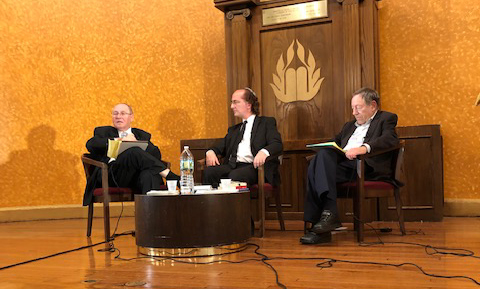Diplomats Discuss Israel’s Role at the UN
Touro Law Hosts Program Featuring Justice Elyakim Rubinstein, former VP of Israeli Supreme Court and Professor Irwin Cotler, former Attorney General of Canada

Touro Law Center invited global diplomats to explore Israel’s relationship with the United Nations at a recent discussion at The Jewish Center on the West Side of Manhattan. Justice Elyakim Rubinstein, former Vice President of the Supreme Court, and Professor Irwin Cotler, former Minister of Justice and Attorney General of Canada, discussed Israel’s history with the United Nations and shared their views on how to move forward. The program was moderated by Touro Law Center Dean Harry Ballan and sponsored by the Touro College and University System.
Dean Ballan opened the program with a quotation from President Franklin Delano Roosevelt’s famous “four freedoms” speech of January 1941, delivered eleven months before the United States entered World War II. Ballan outlined FDR’s description of freedom of speech and worship, and freedom from want and fear as what we would now call the “human rights” that were at stake in the War.
“The ‘four freedoms’ formed the basis of the preamble to the first draft and every draft of the Universal Declaration of Human Rights, the world’s definitive human rights document. This was adopted by the United Nations General Assembly (GA) in 1948, three years after the U.N. charter in 1945 and seven years after FDR’s speech,” says Ballan.
The question of the evening was whether the U.N. has lived up to the lofty goals of the Universal Declaration of Human Rights, particularly in regard to Israel, and what Israel’s relationship with the U.N. should be.
Rubinstein reminded attendees of the significance of the date November 29, 1947--the day the state of Israel was recognized by a resolution of the U.N. General Assembly. “There was dancing in the streets,” he said. Israel’s acceptance as a member of the U.N. in 1949 was also a cause for celebration. However the relationship deteriorated, reaching its nadir in 1975 when the U.N. General Assembly passed a resolution equating Zionism with racism. While the climate has improved in recent years with strong support from the United States, building pro-Israel support at the U.N. General Assembly remains a herculean challenge.
The speakers expounded that the Secretary General and Security Council, which is the rule-making body of the United Nations, have taken a balanced approach toward Israel, for example in Security Council Resolution 242, while the General Assembly and U.N. Specialized Agencies have not. The climate in the General Assembly has improved somewhat. The “Zionism is racism” resolution was reversed in 1991, and a majority of GA members voted in favor of the recent resolution declaring Hamas a terrorist organization. Nevertheless, building support for Israel at the General Assembly and Specialized Agencies remains a challenge.
With that in mind, speakers turned their attention to a question from the audience—why doesn’t Israel give up on the U.N.? Ballan pointed to multilateral alternatives such as NATO and the G8 whose members are primarily democratic, as opposed to the U.N. The question was then asked whether these organizations offer greater potential for positive action.
Cotler and Rubenstein shared their belief that staying engaged with the U.N., from the Secretariat and the Security Council to the General Assembly and the Specialized Agencies, is the best way to encourage the U.N. to live up to the high ideals of the Universal Declaration of Human Rights.
Speaking about one of the UN’s Specialized Agencies, the United Nations Human Rights Council, Cotler said, “When you prepare to adopt 20 resolutions condemning one state but give cover to major human rights violators like Syria, Libya and North Korea, you undermine the authority of international law,” he said.
Quoting Woody Allen, Cotler pointed out, “Eighty percent of moving forward is showing up.” Israel needs to push for recognition as a defender of human rights in order to protect itself but also to safeguard global human rights.
Rubinstein concurred, sharing examples of Israel’s international relations accomplishments in countries like India. Israel opened a consulate in Mumbai in 1953, but did not have an embassy in Delhi until 1992. “Engagement doesn’t mean accepting. It also means fighting. We can’t be afraid to bang our fist on the table, to raise our voices. We need to engage and advocate for what is right,” concurred Rubinstein.
/prod01/channel_38/media/redesign/assets/images/background-images/locations-background.jpg)
